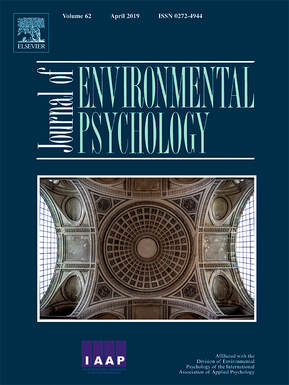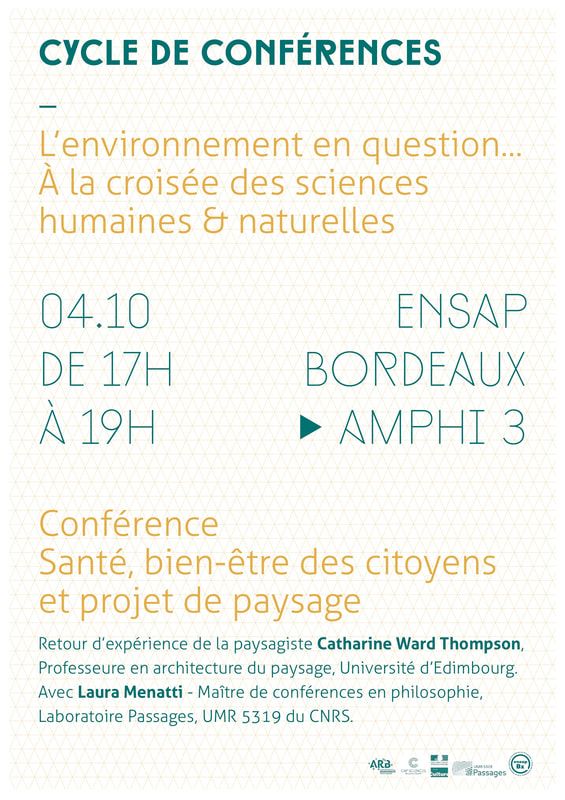0 Comments
 Page de l'ENSAP BORDEAUX L’environnement en question... À la croisée des sciences humaines et naturelles Ce cycle de conférences publiques traite des problématiques environnementales contemporaines et des relations des sociétés à la nature dans une perspective pluridisciplinaire. > coordination pédagogique : Rémi BERCOVITZ - Enseignant chercheur à l’ENSAP & Laura MENATTI - Maître de conférences / Laboratoire Passages, UMR 5319 du CNRS conférences gratuites et ouvertes au public Ce cycle de conférences traite des problématiques environnementales contemporaines et des relations que les sociétés entretiennent avec la nature. À l’heure où les idées de crises et de catastrophes écologiques, d’anthropocène et de fin du monde imprègnent l’air du temps et façonnent les cadres de pensée, au-delà du « prêt à penser » écologique, ce cycle de conférence doit donner la possibilité à chaque citoyen de construire sur ces questions ses propres opinions et de se façonner un regard critique. Or pour aborder ces problématiques brûlantes d’actualité qui, entre faits de société et faits de nature, sont éminemment complexes, seule une approche transversale et transdisciplinaire semble pertinente. En effet, la parcellisation des savoirs et des connaissances ne peuvent y apporter que des réponses réductrices et fragmentaires. Dans cette perspective, la singularité du présent projet est d’inscrire les questions environnementales et l’écologisation de nos sociétés à la croisée des disciplines et au carrefour des sciences sociales et des sciences de l’environnement. Ainsi, philosophes, historiens, géographes, sociologues mais aussi paysagistes, biologistes et écologues partageront leurs points de vue et apporteront leurs éclairages respectifs sur des objets communs. Organisées de manière à créer le maximum de proximité entre scientifiques, acteurs locaux, étudiants et citoyens, toutes les conférences seront suivies d’un moment d’échange pour permettre à chacun de s’exprimer, de poser les questions qu’il désire et d’échanger avec le ou les intervenants. Ce cycle de conférences est organisé par la formation des paysagistes de l’École Nationale d’Architecture et du Paysage de Bordeaux - ENSAP dans le cadre d’un enseignement dispensé en Master 1 et intitulé « Plateau Environnement(s) ». Il repose donc en partie sur les cours des professeurs de l’ENSAP et sur le réseau de chercheurs du laboratoire Passages (UMR 5319 du CNRS). L’Agence Régionale de la Biodiversité Nouvelle-Aquitaine - ARB NA est co-organisateur de ces conférences publiques. Elle y apporte toute son expertise sur les questions d’environnement et de biodiversité ainsi que son appui logistique. # Programme télécharchez le programme My abstract for ICPA 2019 - Groningen (July 3-6 2019) Why ecological psychology is needed in landscape studies. A methodological and pedagogical analysis. Non-symposium abstract Laura Menatti UMR 5319 Passages CNRS ; École Nationale Supérieure d’architecture et de Paysage de Bordeaux Keywords: agency, landscape, teaching landscape, architecture, landscape theory. One of the most used definitions of landscape in the social sciences is: “an area, as perceived by people, whose character is the result of the action and interaction of natural and/or human factors” (Council of Europe 2000a: Article 1). The perceptional dimension of landscape is widely considered as a fundamental: landscape refers indeed to the multifaced stratification of the relationships between the environment and the human beings. It involves different users, practices and perceptions. The theoretical approach of ecological psychology has yet to be taken up in landscape studies and I argue that ecological psychology may constitute a valuable tool in teaching and researching in this domain. Ecological psychology can indeed contribute to answer one the main questions about landscape, that is ‘how we perceive landscape’? More specifically, it can improve landscape analysis and landscape research from several points of view, by focusing on the role of the perceiver as an agent in relationship with the affordances of the landscape, with the following implications: 1) it allows the naturalization of landscape studies as it introduces a scientific perspective in a context where landscape is often framed mostly in socio-cultural terms not always integrated with ecological science. 2) It allows to analyze landscape perception from an embodied point of view, by complementing analysis belonging to phenomenological geography and philosophical phenomenology. 3) It allows to overcome an image-based approach to landscape, both in the definition and in the evaluation of landscape preferences and practices. 4) It allows including the role of the perceiver-agent as a fundamental starting point in landscape design and management. In conclusion, ecological psychology introduces in landscape theory and social sciences an embodied-agential based approach than can contribute to a better understanding of what landscape is, how we perceive it and how we can consider it as the cultural-ecological relation between the human beings and their environments. program of ICPA 2019 see also: The international society for Ecological Psychology  Place attachment and identification as predictors of expected landscape restorativeness Authors: Menatti, L.; Subiza-Pérez, M.; Villalpando-Flores, A.; Vozmediano, L.; San-Juan, C. Abstract: This study explores the roles of place attachment and place identification in the evaluation of the restorative potential of landscapes. Two hundred university students recruited at campuses in the Basque Country (Spain) and Chile evaluated the restorative value of a set of landscape photographs including local and non-local locations. The results indicated that local natural landscapes were preferred and assessed as more restorative as compared to non-local ones, and that place attachment and identification positively predicted their restoration ratings. Conversely, urban local landscapes were less preferred and seen as less restorative than their non-local counterparts. In this latter case, attachment remained a positive predictor whereas identification was found to negatively contribute to the restorative potential of local urban landscapes. In line with recent research, we found that person-place bonding affects landscape preferences and the perception of its restorative properties. This study contributes to an emerging line of research that addresses the role of a wider set of personal, social and cultural variables in the psychological restoration process. |

 RSS Feed
RSS Feed
